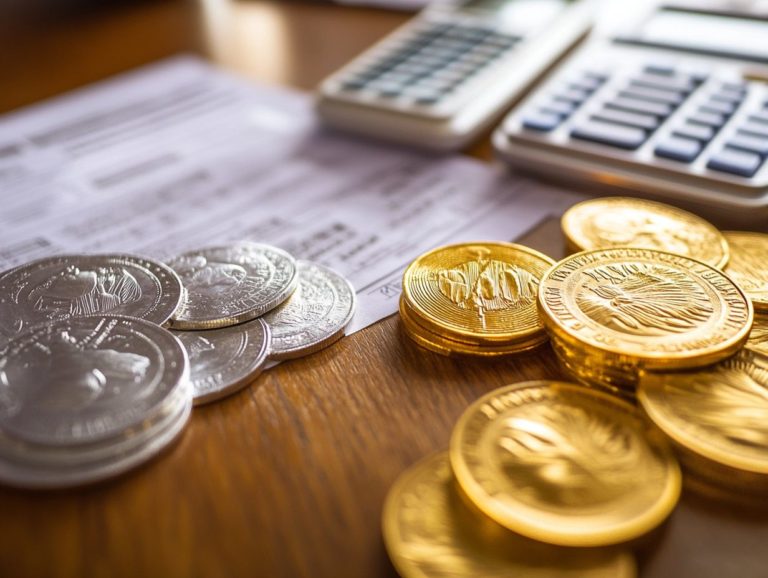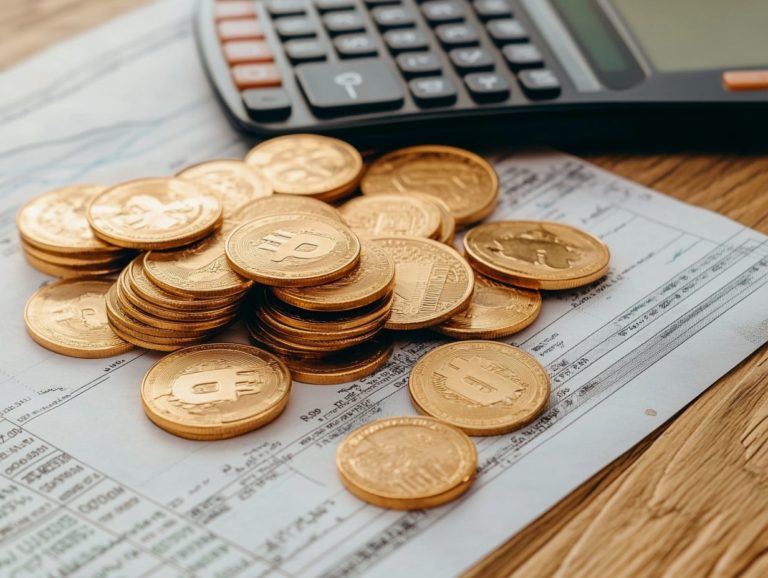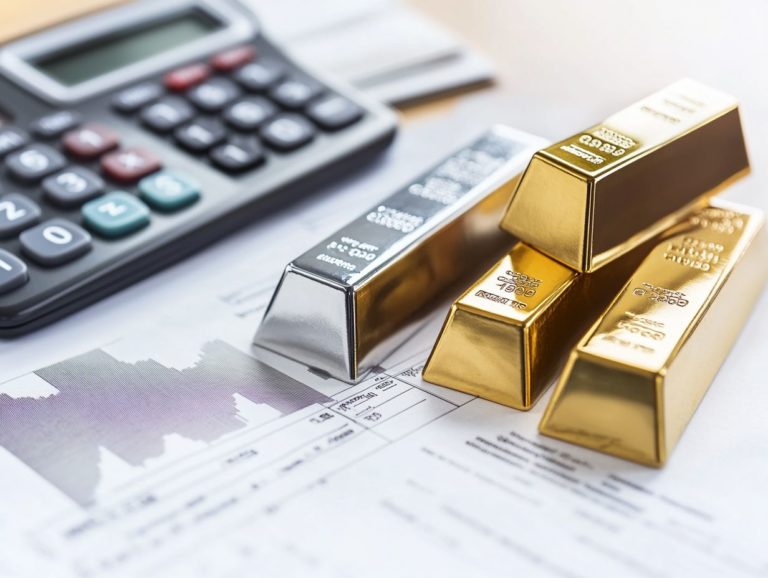What to Know About International Tax on Precious Metals
Are you ready to maximize your investment in precious metals? Navigating the world of precious metals can be as intricate as the metals themselves.
From gold and silver to platinum and palladium, each type can greatly affect your investment returns due to its unique tax implications. This overview delves into the international tax laws governing these valuable assets. We ll outline specific taxation for each metal, essential considerations when buying and selling, and strategies to minimize your tax burden.
By understanding these elements, you can make informed decisions that enhance your investment strategy. Dive in to uncover essential insights for your precious metals journey!
Contents
- Key Takeaways:
- Understanding International Tax on Precious Metals
- Taxation Laws for Different Types of Precious Metals
- Tax Considerations for Buying and Selling Precious Metals
- Impact on Investment Returns
- Tax Reporting Requirements
- Strategies for Minimizing Tax on Precious Metals
- Tax-Free Precious Metal Investments
- Offshore Storage Options
- Frequently Asked Questions
- What to Know About International Tax on Precious Metals?
- What Are the Types of International Taxes on Precious Metals?
- Do All Countries Have the Same Tax Laws for Precious Metals?
- Are There Any Tax Exemptions for Precious Metal Transactions?
- Do I Have to Pay Taxes on Precious Metals Sold Abroad?
- How Can I Minimize My Tax Liability on Precious Metals?
Key Takeaways:
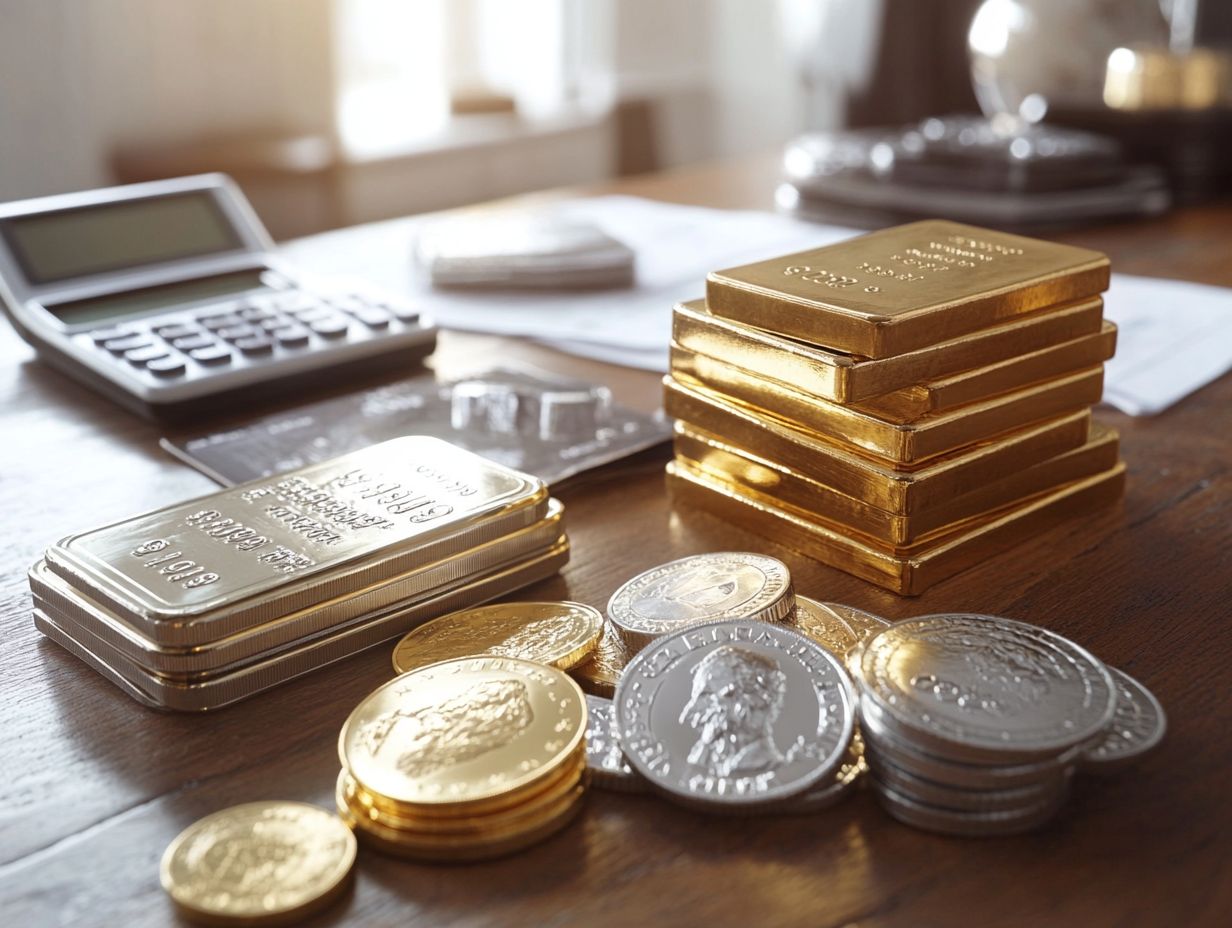
- International taxes can significantly impact returns on precious metals such as gold, silver, platinum, and palladium.
- Each type of precious metal has its own taxation laws, affecting the buying and selling process.
- Investors should consider tax reporting requirements and explore strategies like offshore storage and tax-free investments to reduce taxes on precious metals.
Understanding International Tax on Precious Metals
Understanding international tax on precious metals is essential for you as a U.S. taxpayer with foreign financial assets and investments. It can profoundly affect your financial returns and tax obligations.
This includes assets such as foreign stocks, currency, and other investments issued outside the United States. With the IRS imposing strict reporting standards, even a minor discrepancy can result in hefty penalties.
Therefore, it is crucial for you to be well-informed about your responsibilities, including the requirement to file Form 8938 and report capital gains tax (the tax on profits from selling your investments) on any financial accounts you maintain abroad.
Overview of Taxes on Precious Metals
The taxation landscape for precious metals encompasses several key components, primarily focused on capital gains tax and collectibles tax, both of which can significantly shape your investment decisions.
Understanding these tax implications is essential for you as an investor. Precious metals like gold and silver are classified differently from traditional stocks or bonds. For instance, while most investments fall under long-term capital gains tax rates, selling precious metals is often treated as collectibles, which can attract a hefty tax rate of up to 28%. This distinction can substantially affect your net returns on investments in these tangible assets.
These tax dynamics can also influence your strategies regarding U.S. mutual funds that include precious metals. They can create ripple effects in your long-term financial planning, including your social security benefits; higher overall income from capital gains might reduce your eligibility for certain programs.
Taxation Laws for Different Types of Precious Metals
Taxation laws can differ greatly depending on the type of precious metal in question be it gold, silver, platinum, or palladium. Each category comes with its own set of regulations under IRS guidelines and collectibles tax rates, influencing how you report gains from their sale and the tax liabilities you ll face.
For example, while gold typically incurs a standard capital gains tax, other metals might be subject to different rules based on whether they are classified as collectibles or as investment assets issued by foreign entities. Understanding these nuances is essential for you as an investor aiming to optimize your tax strategy effectively.
Gold
Gold is one of the most universally acknowledged precious metals. Its taxation falls under specific IRS regulations that dictate how investment flows and capital gains tax rates are applied to transactions involving this asset.
When you consider gold investments, you’re stepping into a complex landscape. This landscape includes the buying and selling processes as well as the tax implications tied to those transactions.
It s important to recognize that capital gains tax can significantly impact your returns, especially when you sell at a profit. The rules around reporting foreign financial assets, like gold held in overseas accounts, introduce an additional layer of complexity.
Compliance with these regulations is essential to avoid penalties. Make sure you understand any exemptions that could work in your favor!
Silver

Silver, much like gold, falls under the umbrella of capital gains tax. However, it comes with its own set of intricacies in its classification as a precious metal. This distinction can significantly influence how your transactions are treated under tax law.
As an investor, you need to navigate a complex set of rules that govern the tax implications of buying, selling, or holding silver. Be aware that foreign entities and overseas investment assets can have a considerable impact on your tax liabilities, as various jurisdictions enforce different rules.
If you acquire silver from foreign dealers, you might face additional reporting requirements and see a shift in the taxable amount, especially if your investment is recognized under international agreements.
Master these nuances now to supercharge your tax planning! Understanding these details allows you to ensure compliance while optimizing your returns on precious metal investments.
Platinum
Platinum comes with its own unique tax implications under the IRS, categorizing it as a collectible. This classification can significantly influence your investment decisions and overall profitability.
When you sell platinum investments, be aware that any gains are subject to a maximum capital gains rate of 28%. This is quite different from the more favorable rates that apply to standard investments.
If you re involved in transactions with foreign financial institutions, pay close attention to the filing requirements. These transactions can introduce extra layers of reporting complexities and compliance obligations that you need to navigate carefully.
By understanding these nuances, you can make informed choices that will ultimately enhance your investment strategy and improve your tax planning efforts.
Palladium
Palladium’s tax treatment closely mirrors that of other precious metals. It’s essential for you to grasp the capital gains tax implications if you hold foreign financial assets.
When you sell your palladium holdings, any profit you realize may face significant capital gains tax. This is influenced by how long you’ve held the asset and your overall income bracket.
Familiarize yourself with the specific reporting obligations tied to tax forms like Form 8949, which details your sales of capital assets, and Schedule D.
Engaging with investment managers like Sprott can be crucial in optimizing tax strategies tailored to palladium. They offer valuable insights and comprehensive management of tax liabilities, enabling you to make informed decisions that ensure compliance while maximizing your returns.
Tax Considerations for Buying and Selling Precious Metals
When you engage in buying and selling precious metals, numerous tax considerations emerge. These mainly center around the taxable income you report and the capital gains tax that can substantially affect your net returns as an investor.
Understanding these factors is essential for optimizing your investment strategy.
Impact on Investment Returns
The impact of tax on your investment returns can be significant, especially with capital gains tax and reporting exceptions related to precious metals.
You may find that these obligations influence your net gains, highlighting the necessity of understanding tax laws.
Understanding the difference between short-term and long-term capital gains is pivotal for determining the optimal time to sell. This ultimately affects your overall profitability.
Employing strategies like selling investments at a loss to reduce your tax bill or utilizing tax-advantaged accounts can help you further reduce your liabilities.
Staying compliant with reporting requirements and making the most of available deductions will enhance your return on investments. You can adeptly navigate the complex world of taxation.
Tax Reporting Requirements
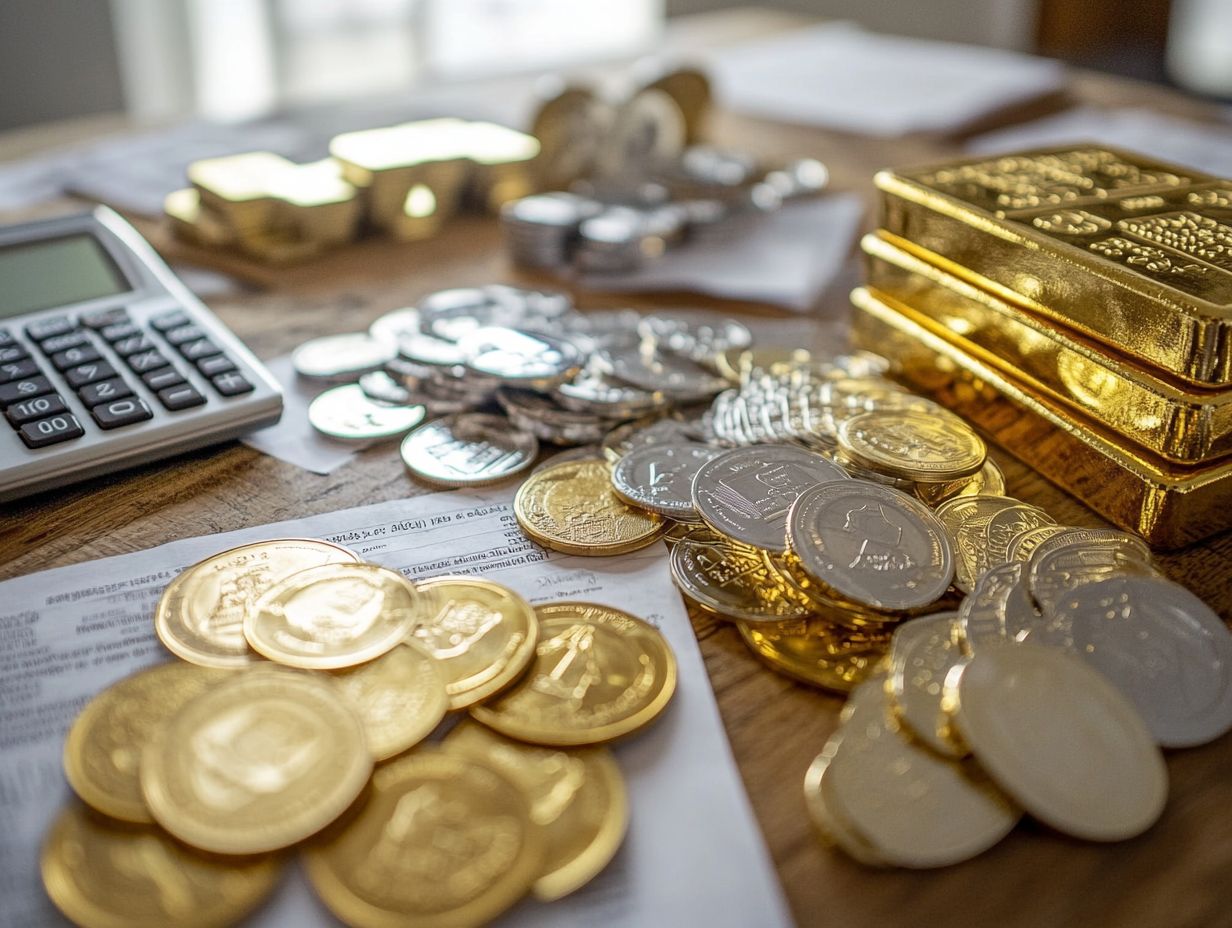
Completing Form 8938 for foreign financial assets is crucial for investors trading in precious metals. Ignoring these obligations can lead to penalties from the IRS.
By adhering to regulations, you ensure all transactions and holdings are transparently reported. This significantly lowers the risk of costly audits or allegations of tax evasion.
Any foreign financial accounts associated with your precious metals must be documented. The IRS requires accurate reporting of these assets to capture their true value and help you avoid legal repercussions.
Understanding the implications of non-compliance can save you from unnecessary financial burdens. Stay informed about your obligations in this intricate tax landscape.
Strategies for Minimizing Tax on Precious Metals
Developing strategies to minimize taxes on precious metals is crucial for investors seeking to enhance their returns.
Explore options for tax-free precious metal investments and consider the benefits of secure storage solutions.
By implementing these strategies, you can optimize your investment outcomes and navigate tax complexities more effectively.
Tax-Free Precious Metal Investments
Tax-free precious metal investments present a remarkable opportunity to enhance your assets without the headache of capital gains tax liabilities.
This strategy is especially beneficial if you want to diversify your portfolio while keeping tax burdens to a minimum.
Consider exploring options like Individual Retirement Accounts (IRAs) that allow precious metals like gold, silver, and platinum, offering tax-deferred growth opportunities.
You can also utilize a 1031 exchange for your precious metal transactions, allowing you to swap investments without immediate taxation.
By exploring these avenues, you can safeguard your wealth against inflation and uncertainty while navigating the tax implications tied to asset appreciation.
Offshore Storage Options
Offshore storage options for precious metals offer not just security, but also strategic tax advantages.
Using these services enables you to minimize your tax liabilities while ensuring compliance with IRS reporting requirements.
Storing precious metals in jurisdictions with favorable tax treaties can lead to potential savings and enhanced privacy, protecting your valuable assets from local taxation.
These arrangements simplify transaction tracking, making it easier for you to adhere to necessary reporting protocols.
Selecting the right offshore facility can provide peace of mind, securing your wealth while aligning with your broader financial strategies.
Watch this video for tips on minimizing tax on precious metals.
Frequently Asked Questions
Act now to safeguard your wealth and start your journey to smarter investments today!
What to Know About International Tax on Precious Metals?
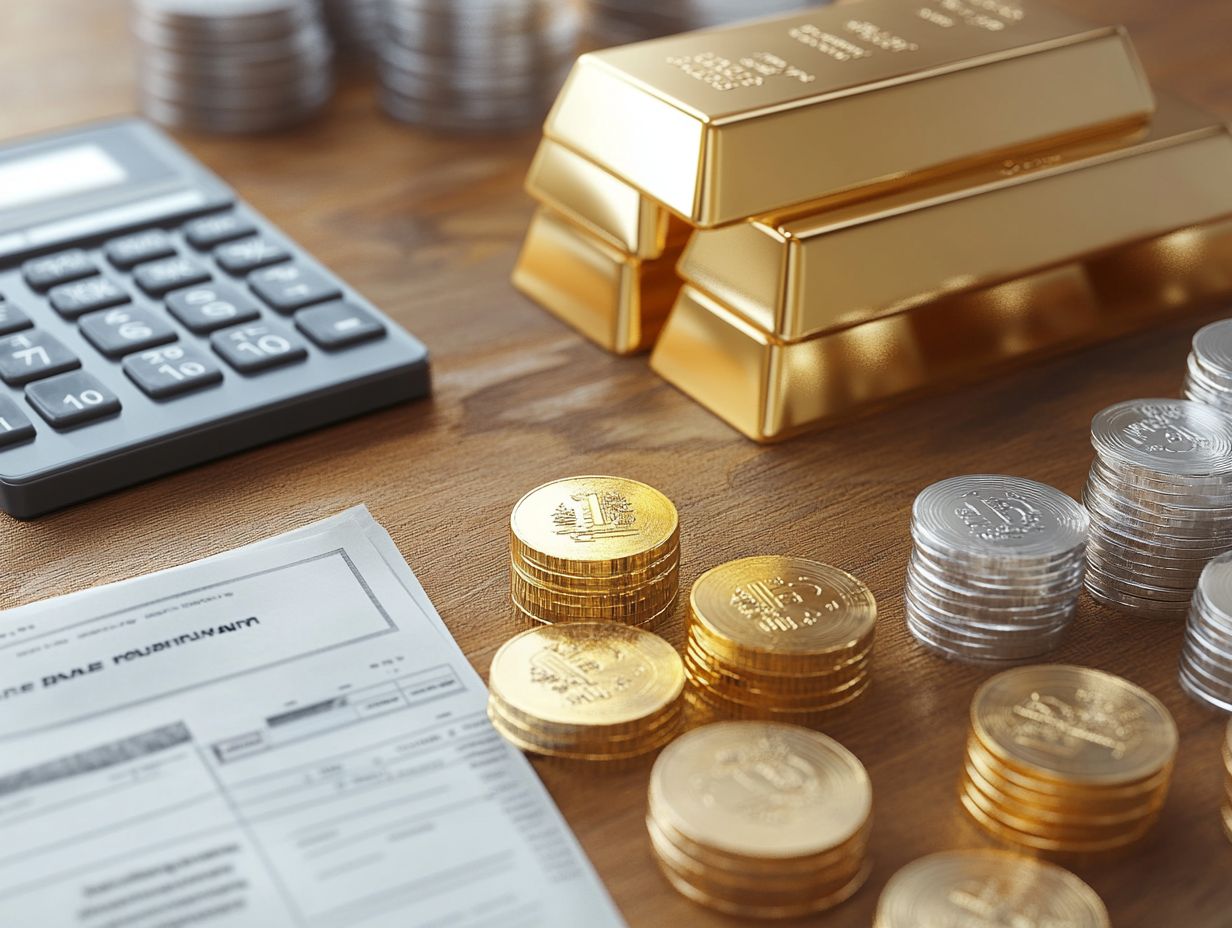
International tax on precious metals refers to taxes on buying, selling, and owning precious metals in various countries. Understanding these taxes helps you avoid financial surprises.
What Are the Types of International Taxes on Precious Metals?
The two main types of international taxes are a sales tax on purchases (VAT) and a tax on profits when selling (CGT). VAT applies when you buy or import precious metals, while CGT hits your profits from sales.
Do All Countries Have the Same Tax Laws for Precious Metals?
No, tax laws differ by country. Some have no taxes, while others impose high rates. Research the specific tax laws before buying or selling precious metals.
Are There Any Tax Exemptions for Precious Metal Transactions?
Some countries offer tax exemptions for investment-grade gold and silver coins. Check the local tax laws for potential exemptions that could benefit your investment.
Do I Have to Pay Taxes on Precious Metals Sold Abroad?
Yes, you might owe taxes in your home country for profits from selling metals in another country. Always consult a tax professional to understand your obligations in both nations.
How Can I Minimize My Tax Liability on Precious Metals?
Consider investing through tax-advantaged accounts like a self-directed IRA. You can also invest in countries with lower tax rates or exemptions. Research and speak with a tax professional before making decisions.










